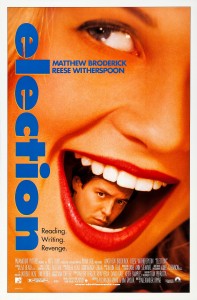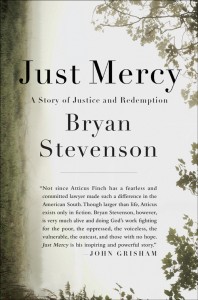“Fighting For What’s Right Is Worth It”
Posted in Editorials on November 17th, 2016by Elizabeth
I do not know what the future holds. But I feel like my personality is coming back to me. My optimism, however muted must still be in my heart somewhere. I have not capitulated to nihilism. Not yet. And I know this because of the email exchange I had with a family member last night.
Elizabeth,
The election has thrown me, as I’m sure you understand.
During the Bush administration, I just kind of stuck my head in the sand.
I know things will suck too much if I do that, so I want to do something to try to help.
I wrote the NRDC to see if they have anything I can volunteer to help with. If they don’t, I’ll donate, but look at other organizations as well.
In thinking about it, it’s seeming pointless. With morons controlling every level, what good is giving to causes that they don’t care about. How can a lobbyist for a cause they don’t care about, change their mind. Short of an organization telling Trump that they will give him a trillion dollars, and make him the first trillionaire, I don’t think anything will stop him from advancing his own business interests.
Am I wrong about that? While sitting and doing nothing is pointless, will donating/volunteering actually get anything done?
Your thoughts are greatly appreciated.
-DL
Dear DL,
This election has thrown most people who voted. Always remember – Hillary Clinton won the popular vote. We are in the majority.
It’s a real and serious loss. People are grieving the future we thought we were going to have. And to make things worse, most of us were certain Hillary Clinton was going to win. It’s not like 2004 when everyone was uncertain. When you prime the brain for reward and get punishment, it really screws your brain chemistry. So there’s a physiological reason that this hurts so bad.
You asked “will donating/volunteering actually get anything done?”
And the answer is of course YES. Hillary Clinton said it herself in her concession speech, “This loss hurts, but please never stop believing that fighting for what’s right is worth it.”
I don’t know what’s going to happen to our country. Donald Trump is somewhere between Michael Bloomberg and Hitler, and looking at his transition team, and the appointments he’s making, he’s certainly not a third way centrist like Bloomberg.
But I was raised by to always try and do good no matter what. I’m going to focus a lot on abortion funds because I still believe they are the best way to help people in need immediately. But there are plenty of other things to do.
The NRDC is a good start. If you are interested in Environmental issues I would also recommend the Sierra Club – they are having a fundraising drive and gearing up for legal battles to come. They also have many local chapters you can get involved with. Also check out 350.org which is explicitly focused on climate change.
The federal government may be lost for a while but that is a reason to focus on state and local government. A good sign that America will not fall to fascism is that dozens of mayors and governors have released statements saying that they will still be sanctuary cities for undocumented immigrants and will not waiver on their anti-discrimination policies for racial, ethnic, religious and LGBT minorities. Maybe you know your Congressional Representative and Senators, but what is going on in your town? Do you read your local paper? Now would be a good time to subscribe. Who runs the local government – both at the city and state level? You have a state assembly member and a state senator [Unless you live in Nebraska, then you just have one]. Find out who these people are and write to them frequently.
If you want to know how one person can make a difference, I will spare you the quotes you see on inspirational posters and share with you a true story which I’m stealing from wikipedia:
At the time, the Japanese government required that visas be issued only to those who had gone through appropriate immigration procedures and had enough funds. Most of the refugees did not fulfill these criteria. Sugihara dutifully contacted the Japanese Foreign Ministry three times for instructions. Each time, the Ministry responded that anybody granted a visa should have a visa to a third destination to exit Japan, with no exceptions. From 18 July to 28 August 1940, aware that applicants were in danger if they stayed behind, Sugihara decided to grant visas on his own. He ignored the requirements and issued ten-day visas to Jews for transit through Japan, in violation of his orders. Given his inferior post and the culture of the Japanese Foreign Service bureaucracy, this was an unusual act of disobedience. He spoke to Soviet officials who agreed to let the Jews travel through the country via the Trans-Siberian Railway at five times the standard ticket price.
Sugihara continued to hand-write visas, reportedly spending 18–20 hours a day on them, producing a normal month’s worth of visas each day, until 4 September, when he had to leave his post before the consulate was closed. By that time he had granted thousands of visas to Jews, many of whom were heads of households and thus permitted to take their families with them. According to witnesses, he was still writing visas while in transit from his hotel and after boarding the train at the Kaunas Railway Station, throwing visas into the crowd of desperate refugees out of the train’s window even as the train pulled out. In final desperation, blank sheets of paper with only the consulate seal and his signature (that could be later written over into a visa) were hurriedly prepared and flung out from the train. As he prepared to depart, he said, “Please forgive me. I cannot write anymore. I wish you the best.”
When he bowed deeply to the people before him, someone exclaimed, “Sugihara. We’ll never forget you. I’ll surely see you again!” Sugihara himself wondered about official reaction to the thousands of visas he issued. Many years later, he recalled, “No one ever said anything about it. I remember thinking that they probably didn’t realize how many I actually issued.” The total number of Jews saved by Sugihara is in dispute, estimating about 6,000; family visas—which allowed several people to travel on one visa—were also issued, which would account for the much higher figure. The Simon Wiesenthal Center has estimated that Chiune Sugihara issued transit visas for about 6,000 Jews and that around 40,000 descendants of the Jewish refugees are alive today because of his actions.
Things really suck right now, and I can’t tell you if or when they will get better. But anything that you do to help other people or your country in this dark time will help, will make a difference and will be worth it.
Love,
Elizabeth











